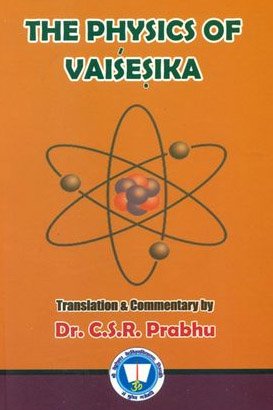Amurtaguna, Amūrtaguṇa, Amurta-guna: 2 definitions
Introduction:
Amurtaguna means something in Hinduism, Sanskrit. If you want to know the exact meaning, history, etymology or English translation of this term then check out the descriptions on this page. Add your comment or reference to a book if you want to contribute to this summary article.
In Hinduism
Vaisheshika (school of philosophy)
Source: Shodhganga: A study of Nyāya-vaiśeṣika categories (vaisesika)Amūrtaguṇa (अमूर्तगुण) or simply Amūrta refers to a classification of the twenty-four guṇas (qualities) according to the Vaiśeṣikadarśanam with Praśastapādabhāṣya and the Bhāṣāpariccheda.—Guṇas are also divided into mūrtaguṇa, amūrtaguṇa and mūrtāmūrtaguṇa. These divisions are found in the Praśastapādabhāṣya and also in the Bhāṣāpariccheda. Cognition, pleasure, pain, desire, aversion, merit, demerit and sound are amūrtaguṇas i.e., these guṇas abide in unlimited things.

Vaisheshika (वैशेषिक, vaiśeṣika) refers to a school of orthodox Hindu philosophy (astika), drawing its subject-matter from the Upanishads. Vaisheshika deals with subjects such as logic, epistemology, philosophy and expounds concepts similar to Buddhism in nature
Languages of India and abroad
Sanskrit dictionary
Source: DDSA: The practical Sanskrit-English dictionaryAmūrtaguṇa (अमूर्तगुण).—(in Vaiś. Phil.) a quality considered to be अमूर्त (amūrta) or incorporeal such as धर्म, अधर्म (dharma, adharma) &c.; धर्माधर्मौ भावना च शब्दो बुद्धपादयोऽपि च । एते मूर्तगुणाः सर्वे (dharmādharmau bhāvanā ca śabdo buddhapādayo'pi ca | ete mūrtaguṇāḥ sarve) Bhāṣa P.
Derivable forms: amūrtaguṇaḥ (अमूर्तगुणः).
Amūrtaguṇa is a Sanskrit compound consisting of the terms amūrta and guṇa (गुण).
Sanskrit, also spelled संस्कृतम् (saṃskṛtam), is an ancient language of India commonly seen as the grandmother of the Indo-European language family (even English!). Closely allied with Prakrit and Pali, Sanskrit is more exhaustive in both grammar and terms and has the most extensive collection of literature in the world, greatly surpassing its sister-languages Greek and Latin.
See also (Relevant definitions)
Partial matches: Guna, Amurta.
Ends with: Murtamurtaguna.
Full-text: Amurta, Murtamurta, Murtamurtaguna, Murtaguna, Murta.
Relevant text
Search found 1 books and stories containing Amurtaguna, Amūrtaguṇa, Amurta-guna, Amūrta-guṇa; (plurals include: Amurtagunas, Amūrtaguṇas, gunas, guṇas). You can also click to the full overview containing English textual excerpts. Below are direct links for the most relevant articles:
Nyaya-Vaisheshika categories (Study) (by Diptimani Goswami)
Different Types of Quality (Introduction) < [Chapter 4 - Quality and Action]